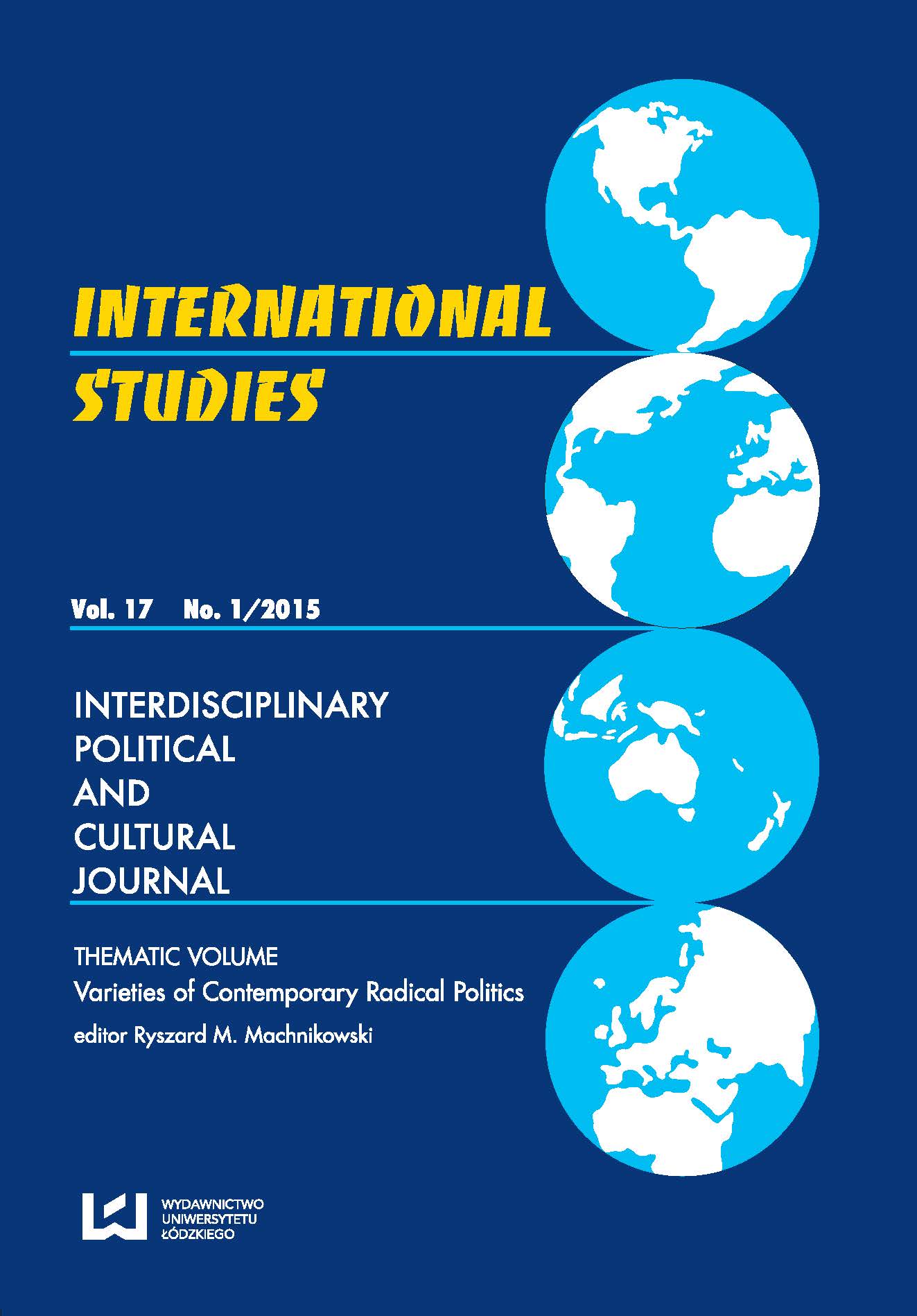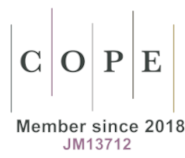Defining Political Extremism in the Balkans. The Case of Serbia
DOI:
https://doi.org/10.1515/ipcj-2015-0006Słowa kluczowe:
Balkans, extremism, political extremism, right-wing, SerbiaAbstrakt
Political extremism (and particularly right wing political extremism) remains relatively insufficiently explored due to the fact that the phenomenon is controversial and hard to define. Its ambiguity and variability depending on time and spatial point of view further complicates its definition. Its structure is amorphous and eclectic as it often includes elements from different ideologies and connects incompatible ideas. A multidimensional conceptualization and an interdisciplinary approach - sociological, social, psychological and historical, are the Author’s tools in explaining the phenomenon of political extremism in Serbia, hopefully contributing to its clarification and laying a foundation for its further explanatory theoretical studies.
Pobrania
Bibliografia
http://ada.evergreen.edu/~arunc/texts/frankfurt/marcuse/tolerance.pdf (accessed: December 20, 2014)
Zobacz w Google Scholar
Adorno, T.W., Frenkel-Brunswik, E., Levinson, D.J., Sanford, R.N., The Authoritarian Personality, Harper and Row, New York, 1950.
Zobacz w Google Scholar
Backes, U. Politische Extreme. Eine Wort- und Begriffsgeschichte von der Antike bis zur Gegenwart. Goettingen: Vandenhoeck & Ruprecht, 2006.
Zobacz w Google Scholar
Backes, U., Meaning and Form of Political Extremism, Part 4, Volume IX, Autumn 2007 Central European Political Studies Review, Masaryk University, 2007.
Zobacz w Google Scholar
Backes, U., Politische Extreme. Eine Wort- und Begriffsgeschichte von der Antike bis zur Gegenwart, Vandenhoeck & Ruprecht, Goettingen, 2006.
Zobacz w Google Scholar
Cvijić, J., Studies in Yugoslav Psychology, (translated by Fanny Foster), The Slavonic and East European Review, 9, 1930/31.
Zobacz w Google Scholar
Deutsche Welle,Srbija – Desničari koketiraju sa političkom elitom, 19.11.2011, at: http://www.dw.de/srbija-desni%C4%8Dari-koketiraju-s-politi%C4%8Dkom-elitom/a-15540740 (accessed: February 3, 2015)
Zobacz w Google Scholar
Djordjević, M., Ratni krst Srpske Crkve, Republika No. 273 at: http://www.yurope.com/zines/republika/arhiva/2001/273/273_20.html (accessed: February 2, 2015)
Zobacz w Google Scholar
Glare, P.G.W. Oxford Latin Dictionary, Oxford/Clarendon Press, 1982.
Zobacz w Google Scholar
Golubović, Z., Kuzmanović, B., Vasović, M., Društveni karakter i društvene promene u svetlu nacionalnih sukoba, Filip Višnjić, Beograd, 1995.
Zobacz w Google Scholar
Hainsworth, P., Extreme Right in Western Europe, Routledge, New York, 2008.
Zobacz w Google Scholar
Halpern, J., Kideckel, D.,(eds.), 2000, Neighbors at War. Anthropological Perspectives on Yugoslav Ethnicity, Culture and History, Pennsylvania State University.
Zobacz w Google Scholar
Klandermans, B., Meyer, N., Extreme right activists in Europe, Routledge, London and New York, 2006.
Zobacz w Google Scholar
Lazić, M., Razaranje društva,jugoslovensko društvo u krizi 90-ih, Filip Višnjić, Beograd, 1994.
Zobacz w Google Scholar
Marcuse, H. Repressive Tolerance, 1965, at: http://ada.evergreen.edu/~arunc/texts/frankfurt/marcuse/tolerance.pdf (accessed: December 20, 2014).
Zobacz w Google Scholar
Mundjiu-Pipidi, A., Miloševićevi birači – objašnjenje za nacionalizam u postkomunističkoj Evropi koji je potekao iz masa, in: Nacionalizam posle komunizma, Beogradski fond za političku izuzetnost, Beograd, 2003.
Zobacz w Google Scholar
Nacionalni Stroj at: https://www.stormfront.org (accessed: January 29, 2015).
Zobacz w Google Scholar
Offe, K.,Varieties of Transition: The East Europeanand East German Experience, The MIT Press, 1996.
Zobacz w Google Scholar
Potocky-Tripodi, M., Best Practices for Social Work With Refugees and Immigrants, Columbia University Press, New York, 2002.
Zobacz w Google Scholar
Radenović, S., Oblici rasizma u Srbiji nakon petooktobarskih promena (2001-2006), Akademska Misao, Beograd, 2008.
Zobacz w Google Scholar
Reich, W. The Mass Psychology of Fascism. New York: Orgone Institute Press, 1946.
Zobacz w Google Scholar
Reich, W., The Mass Psychology of Fascism, Orgone Institute Press, New York, 1946.
Zobacz w Google Scholar
Sekelj, L., Vreme beščašća – Ogledi o vladavini nacionalizma, Akademia Nova, Beograd, 1995.
Zobacz w Google Scholar
Srbska Akcija at: http://www.srb-akcija.org (accessed: January 29, 2015).
Zobacz w Google Scholar
Stormfront Srbija at: https://www.stormfront.org/forum/t245784/ (accessed January 29, 2015).
Zobacz w Google Scholar
Vujačić, I., Jačanje ekstremne desnice u postkomunističkim zemljama, in: Politička teorija – ogledi, portreti, rasprave, Čigoja štampa, Beograd, 2002.
Zobacz w Google Scholar
Pobrania
Opublikowane
Jak cytować
Numer
Dział
Licencja

Utwór dostępny jest na licencji Creative Commons Uznanie autorstwa – Użycie niekomercyjne – Bez utworów zależnych 4.0 Międzynarodowe.

















